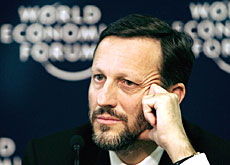Davos – Porto Alegre without the sun?

First-time participants at this year’s WEF meeting could be forgiven for thinking they had gone to Porto Alegre by mistake.
Public sessions in the first two days have focused heavily on social issues, notably poverty, disease and ethical business practices.
It is a similar agenda to that of the “rival” World Social Forum (WSF) now taking place in the Brazilian city.
WEF veteran Rolf Jeker, who is executive vice-president at the Geneva-based inspection and verification company Société Générale de Surveillance (SGS), told swissinfo he was not surprised by the “social” emphasis of the Davos meeting.
Jeker is a former director of the African Development Bank.
swissinfo: Do you notice a change in emphasis at Davos this year?
Rolf Jeker: This is about the 15th time I’ve been to Davos, and there have been phases in the past where social issues were high on the agenda. But, while the agenda varies over the years, the major themes always come back.
Obviously, issues like poverty and equitable globalisation are of concern to both governments and the private sector. Also, the stronger involvement of non-governmental organisations in the past few years has clearly had an effect.
swissinfo: The British prime minister, Tony Blair, put the spotlight on Africa and poverty during his opening speech. Is this more than just rhetoric?
R.J.: That remains to be seen. These sorts of occasions do give heads of state the opportunity to speak to a wide and important audience [about more general issues]. I do believe they generally mean what they say, and I think it is very good that Blair pointed out some issues where leadership is needed – Africa was one, but also climate change.
Of course, when people go home, particularly political leaders, they will face political realities in their own countries, and a lot will be watered down.
swissinfo: Do you think Blair’s initiative is addressing the right issues the right way?
R.J.: I think he has the right issues, and there clearly are distinctions to be made between, say, humanitarian issues and health or water access. What in my view was not clear enough, particularly with [the address by French] President Chirac, was that we got the impression that more money alone will do the trick. This will definitely fail.
Either they come up with some credible programmes that are backed by African governments on the economic and political front, or these initiatives, which are well-meant, will not bring the change in Africa that we would like to see.
swissinfo: What do you think are the main issues, and what solutions need to be found?
R.J.: In Africa, it is the issue of governance – political and economic – that has to provide the platform for additional funding to be able to achieve results. In the 1970s and 1980s, more money led to new structures, but not to sustainable wealth, at least not for the broad mass of the population.
In the 1960s, the situation in Asia was not any different – there is the telling example of 1960, when South Korea and Ghana were at the same level of development. The difference now is certainly striking, even given that Ghana is one of the best economic performers in Africa today.
swissinfo: Davos focuses very much on the importance of partnerships, particularly between business and politics. What role do you think business should play in addressing these issues?
R.J.: The first and foremost task of a company is to make money. But companies are increasingly taking account of issues that indirectly affect them, and are becoming more prepared to participate in initiatives, particularly in the form of public-private partnerships.
There are some successful examples of these, and I think this is something that would need to be pushed forward. The problem there is often that, on the public side, bureaucracy takes over and initiatives that are well meant end up lingering for years without producing results.
swissinfo: Do you think it is up to governments to take the lead, on the basis that companies will only act when they see the issue is not going to go away?
R.J.: What is important is that companies are not asked to do what governments fail to do. [Also], companies will not engage if they feel that this will result in additional costs and a negative impact on competitiveness – they will wait.
So the rules of engagement have to be clear and the governments behind them have to make it clear that the ideas are serious and going forward. Once the stage is set and it is clear what needs to be done, for instance with regard to climate change, I think companies will do it.
swissinfo: What is your own company, SGS, doing in this area?
R.J.: One of our main objectives is to provide transparency and trust, so all initiatives that have to do with good governance are in the forefront of our business, including corporate social responsibility and proper certification. I think this is an area where the future holds a lot of promise.
swissinfo-interview: Chris Lewis
Rolf Jeker is a former senior official at the Swiss economics ministry.
He also served as a director of the African Development Bank.
Since 1999 he has been senior executive vice-president of SGS.
With more than 37,000 employees, SGS is the world’s leading verification and monitoring company in terms of sales.

In compliance with the JTI standards
More: SWI swissinfo.ch certified by the Journalism Trust Initiative











You can find an overview of ongoing debates with our journalists here . Please join us!
If you want to start a conversation about a topic raised in this article or want to report factual errors, email us at english@swissinfo.ch.